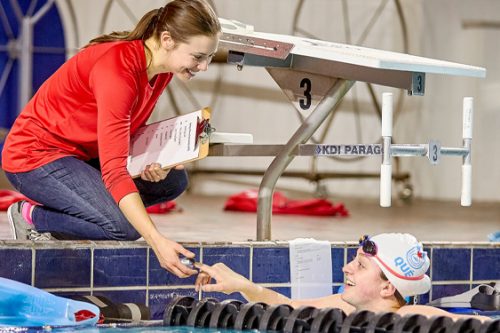Serving athletes through science
Biomechanics
Biomechanics specialists at INS Québec analyze sports movements to improve performance and reduce the risk of injury. For example, biomechanical measurements taken during exercise using dynamometric sensors positioned on various parts of the athlete’s body provide crucial performance-related information. Similarly, video measurements and analysis provide rapid feedback for learning and refining complex movements, while providing insight into the technical analyses that coaches need in order to properly train athletes.
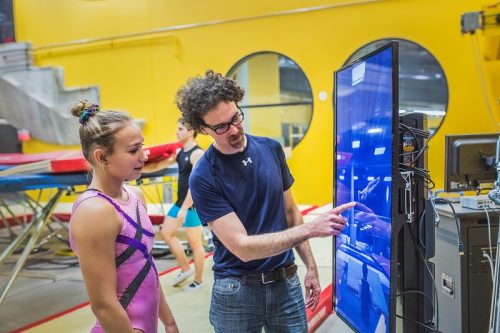
Nutrition
Nutritionists at INS Québec advise athletes on all aspects of nutrition in order to improve their performance and to reduce the risk of health problems. They analyze food consumption to ensure optimal energy availability.
At the INS Québec nutrition laboratory, athletes learn to cook in accordance with the recommendations given by nutritionists. At INS Québec, athletes’ body composition can also be measured using a BOD POD. This non-invasive and precise machine uses air displacement plethysmography to determine body density, which enables an assessment of body fat and lean body mass.
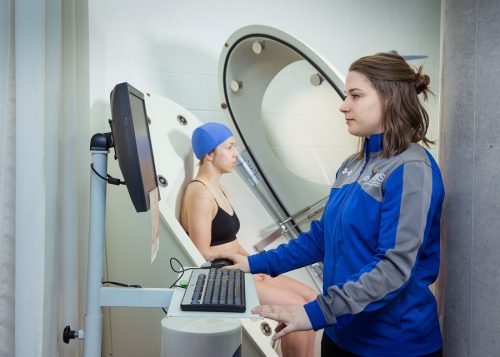
Physiology
Physiologists at INS Québec test, analyze and interpret the body’s responses and adjustments to exercise.
In the exercise physiology laboratory, maximum oxygen consumption (VO2 max) and movement efficiency can be measured using the Vmax metabolic cart. The COSMED K5 portable metabolic device is also used to test athletes on the sports field. The h/p/cosmos treadmill is suitable for high-level athletes, with speed and slope gradient variations over long distances. Other devices are also used to better simulate the athlete’s sport, such as Lode ergocycles and ergometers simulating kayaking or canoeing.
Recovery and regeneration are at the very heart of a physiologist’s work. At the INS Québec sleep clinic, athletes can use jet massage beds for accelerated recovery or more restorative sleep. They also have the opportunity to monitor their activity when sleeping in a very precise way using Motion Watch© triaxial digital accelerometers. The goal is primarily to improve their sleep, but also to develop individual strategies geared to limiting the negative effects created by the long flights that are necessary to get to training or competition sites.
INS Québec offers athletes a service that aims to improve physical and mental recovery using innovative technologies and protocols based on the latest scientific developments. For example, athletes have access to blood flow stimulators, such as VeinoplusSport©, cold baths (which allow, in accordance with certain treatments, to reduce aches and pains) and cutting-edge methods to promote rest and relaxation and therefore, regeneration between intensive training sessions.
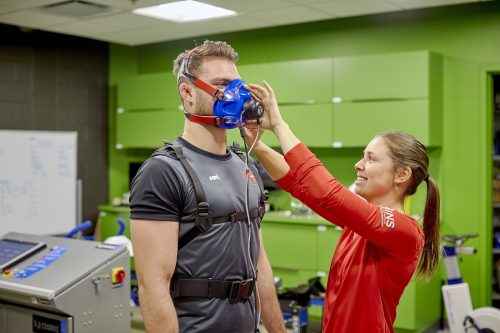
Mental preparation
INS Québec’s mental trainers use methods based on psychology and cognitive science to develop athletes’ mental and cognitive skills in order to optimize performance, while encouraging enjoyment and independence.
Methods include relaxation, mindfulness and visualization techniques, creative sessions and perceptual-cognitive training.
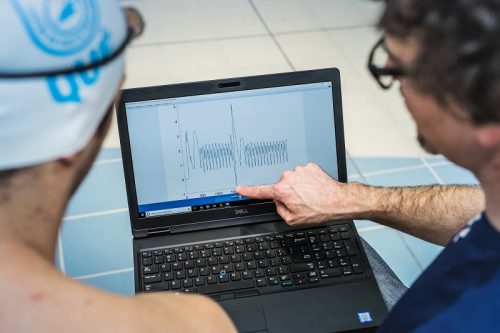
Strength and conditioning
The strength and conditioning coaches at INS Québec develop and deliver personalized training regimes that allow athletes to develop their physical capabilities.
By using the vertical jump test on a force plate, strength and conditioning coaches measure power, force and jump time, as well as other indicators of neuromuscular function. These are very useful in tracking the daily training load of athletes and in adjusting the strength and conditioning program.
During running, swimming or skating sprint sessions (assisted or resisted), INS Québec strength and conditioning coaches can measure power, strength, speed and acceleration using a portable device called the 1080 Sprint. The ability to quickly change direction is also assessed.
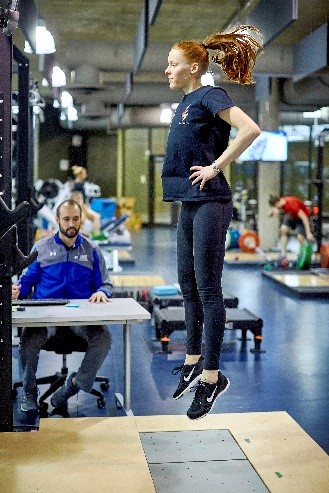
Performance analysis
Athletes, coaches, sports administrators and the scientific and medical staff at INS Québec use a computer system (developed for INS Québec by Hexfit©) which can be used to record, organize, share and present scientific, sports and medical data in the form of dashboards updated in real time. This helps all members of the Integrated Support Team (IST) who must constantly make objective decisions that promote performance while reducing the risk of injury or excessive training.
Various devices allow INS Québec scientists to take physiological performance measurements. For example, by using a maximum test with a gradual speed increase, it is possible to assess cardiorespiratory fitness while monitoring the changes in key variables through different stages: perception of effort, heart rate, blood lactate concentration, etc. At altitude, a finger pulse oximeter is used to measure the blood’s oxygen level.
